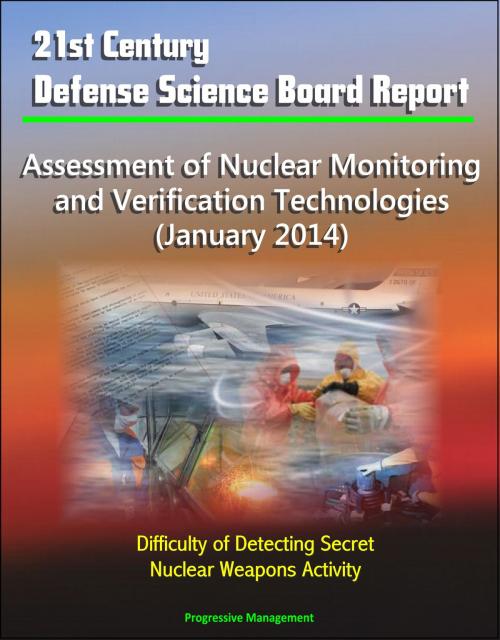21st Century Defense Science Board Report: Assessment of Nuclear Monitoring and Verification Technologies (January 2014) - Difficulty of Detecting Secret Nuclear Weapons Activity
Nonfiction, Social & Cultural Studies, Political Science, Politics, Arms Control, History, Military, Nuclear Warfare| Author: | Progressive Management | ISBN: | 9781311168320 |
| Publisher: | Progressive Management | Publication: | January 27, 2014 |
| Imprint: | Smashwords Edition | Language: | English |
| Author: | Progressive Management |
| ISBN: | 9781311168320 |
| Publisher: | Progressive Management |
| Publication: | January 27, 2014 |
| Imprint: | Smashwords Edition |
| Language: | English |
This report from the Defense Science Board, issued in January 2014 and widely reported in the media, discusses the difficulty of detecting secret nuclear weapons activity and recommends improvements of nuclear monitoring and verification technologies.
A relatively straightforward, albeit technically rich, charge was given to this Task Force to assess technologies in support of future arms control and nonproliferation treaties and agreements. The Task Force, however, quickly realized that addressing this charge alone would be of limited value without considering a broader context for nuclear proliferation into the foreseeable future. That realization resulted from a number of factors which included:
* Accounts of rogue state actions and their potential cascading effects;
* The impact of advancing technologies relevant to nuclear weapons development;
* The growing evidence of networks of cooperation among countries that would otherwise have little reason to do so;
* The implications of U.S. policy statements to reduce the importance of nuclear weapons in international affairs, accompanied by further reductions in numbers, which are leading some longtime allies and partners to entertain development of their own arsenals;
* The wide range of motivations, capabilities, and approaches that each potential proliferator introduces.
In such a context, the technical approach for monitoring cannot continue to derive only from treaty and agreement dictates for "point" compliance to the numbers and types formally agreed upon and geographically bounded. Proliferation in this future context is a continuous process for which persistent surveillance tailored to the environment of concern is needed. This leads to the need for a paradigm shift in which the boundaries are blurred between monitoring for compliance and monitoring for proliferation, between cooperative and unilateral measures. Monitoring will need to be continuous, adaptive, and continuously tested for its effectiveness against an array of differing, creative and adaptive proliferators. The Task Force therefore took a step back to create a comprehensive monitoring framework and to propose both improvements to existing tools and capabilities, as well as new approaches and dimensions to traditional monitoring means. Actions are recommended not only for DoD, but also for agencies in the larger national security community, that co-sponsored the study and for which DoD serves both supporting and supported roles.
This report from the Defense Science Board, issued in January 2014 and widely reported in the media, discusses the difficulty of detecting secret nuclear weapons activity and recommends improvements of nuclear monitoring and verification technologies.
A relatively straightforward, albeit technically rich, charge was given to this Task Force to assess technologies in support of future arms control and nonproliferation treaties and agreements. The Task Force, however, quickly realized that addressing this charge alone would be of limited value without considering a broader context for nuclear proliferation into the foreseeable future. That realization resulted from a number of factors which included:
* Accounts of rogue state actions and their potential cascading effects;
* The impact of advancing technologies relevant to nuclear weapons development;
* The growing evidence of networks of cooperation among countries that would otherwise have little reason to do so;
* The implications of U.S. policy statements to reduce the importance of nuclear weapons in international affairs, accompanied by further reductions in numbers, which are leading some longtime allies and partners to entertain development of their own arsenals;
* The wide range of motivations, capabilities, and approaches that each potential proliferator introduces.
In such a context, the technical approach for monitoring cannot continue to derive only from treaty and agreement dictates for "point" compliance to the numbers and types formally agreed upon and geographically bounded. Proliferation in this future context is a continuous process for which persistent surveillance tailored to the environment of concern is needed. This leads to the need for a paradigm shift in which the boundaries are blurred between monitoring for compliance and monitoring for proliferation, between cooperative and unilateral measures. Monitoring will need to be continuous, adaptive, and continuously tested for its effectiveness against an array of differing, creative and adaptive proliferators. The Task Force therefore took a step back to create a comprehensive monitoring framework and to propose both improvements to existing tools and capabilities, as well as new approaches and dimensions to traditional monitoring means. Actions are recommended not only for DoD, but also for agencies in the larger national security community, that co-sponsored the study and for which DoD serves both supporting and supported roles.















